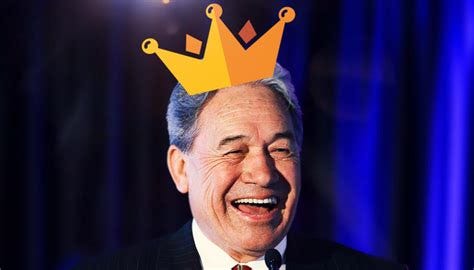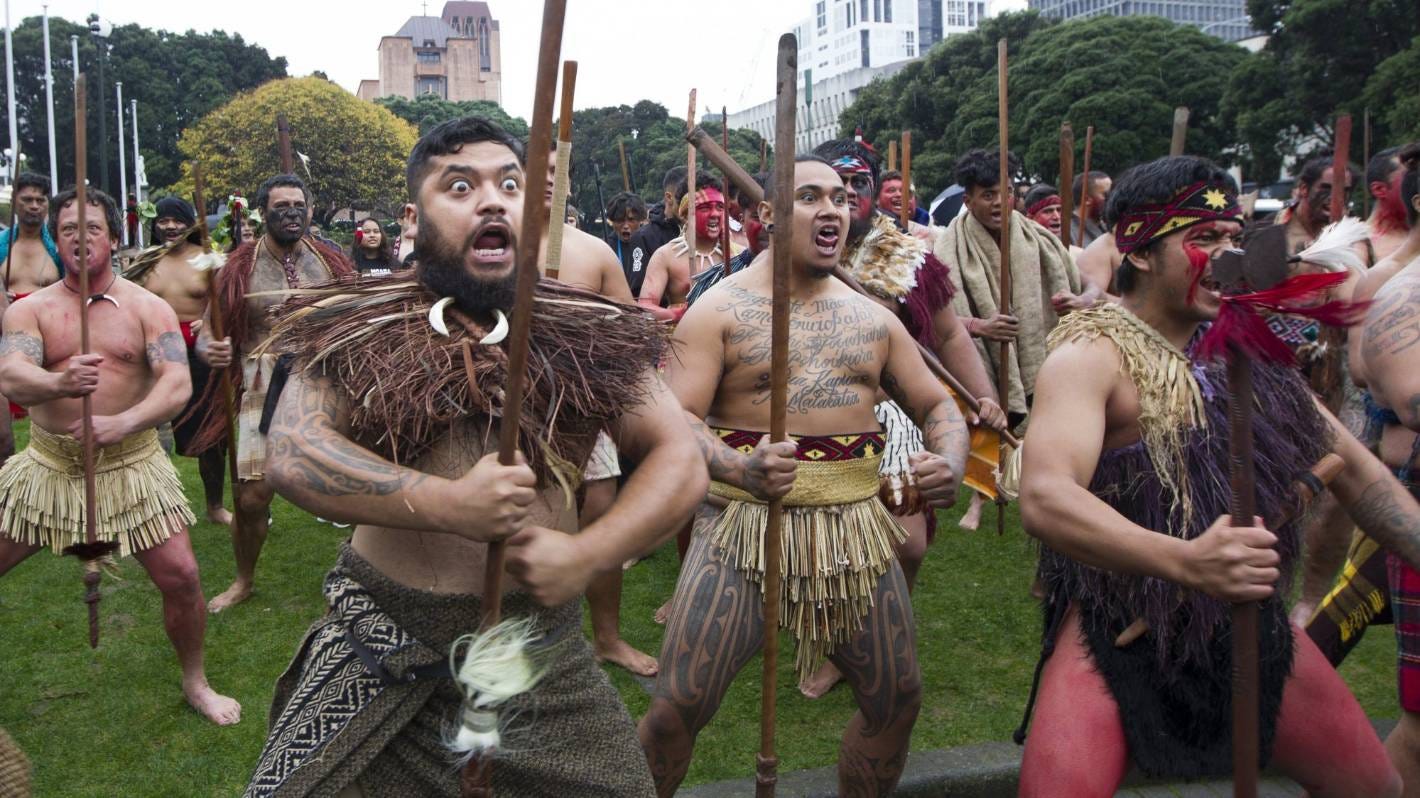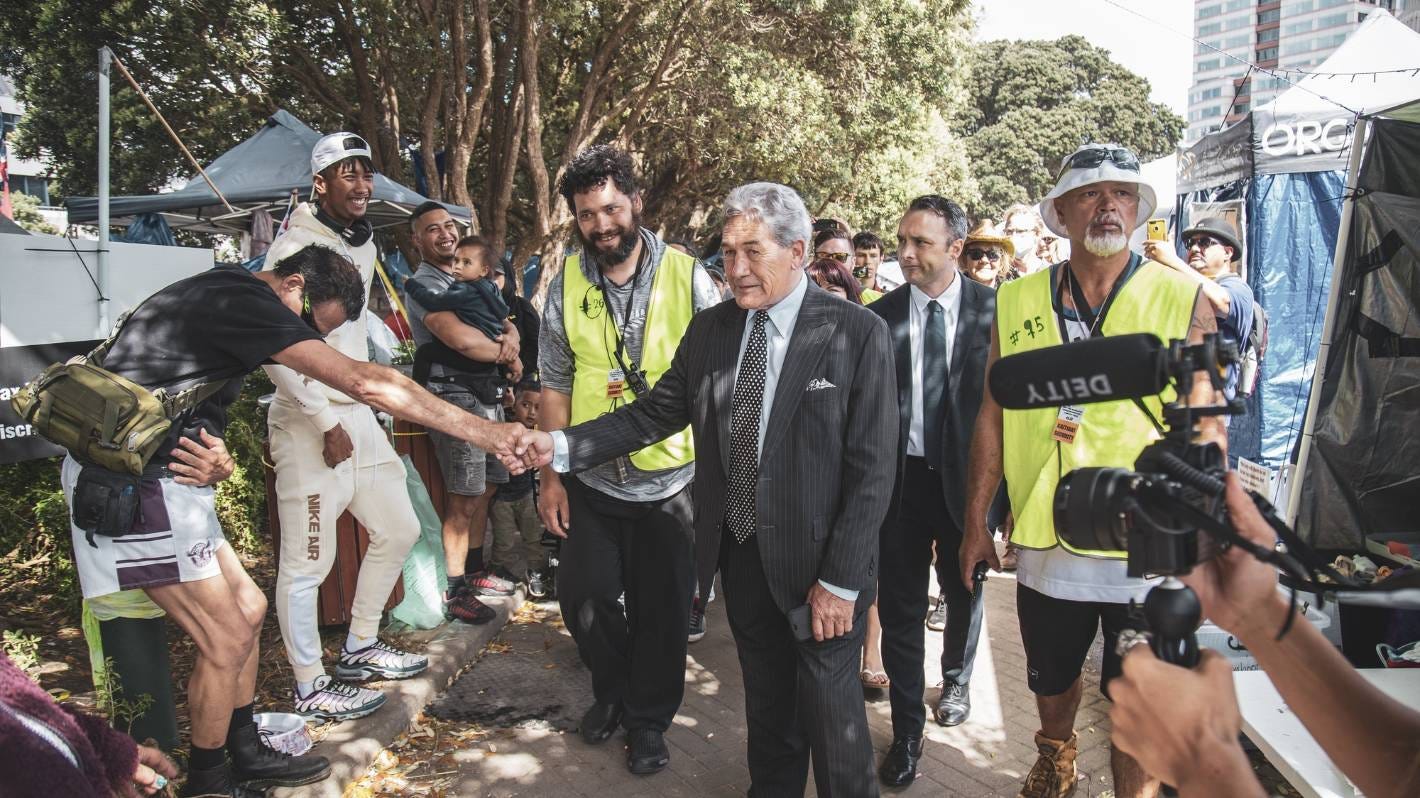Winston Peters is not afraid to take on Klaus Schwab
Who is Winston Peters?
Winston Peters, the newly appointed foreign minister of New Zealand, has been one of the most opportunistic populist politicians NZ has ever seen. Nicknamed “kingmaker”, Peters played the MMP card (Mixed-member proportional representation) to perfection since the voting system changed in New Zealand from first-past-the-post in 1993.
The MMP system gives smaller parties who reach a certain vote threshold (usually 5%) of their nationwide party vote seats in the parliament without having to win individual electorates. More importantly, they often hold the balance of power if the two major parties don’t reach an absolute majority (over 50%). Two or sometimes three parties enter a coalition agreement to form a government.
Peters, of Maori heritage, has a rebel personality. He was an MP for the National Party for four terms from 1979 to 1993 but lost his National seat after criticising his party. He left the party and became an independent MP in 1993.
In June 1992, Winston Peters, a former Minister of Māori Affairs in the National Party governor of Jim Bolger, was told that he would not be allowed to run for another term as National Party Member of Parliament for Tauranga in the 1993 election.[21][22] Peters had previously been dismissed from the Cabinet in 1991, after he publicly criticised National's economic policy.[21] (Source)
In 1992, Peters founded his own party - New Zealand First - which won two parliamentary seats in the 1993 elections. Fortunes changed dramatically for Peters when MMP was used the first time in 1996. NZ First won 13% of the votes and became “kingmaker” for the first time.
Everyone expected Peters to side with Labor after his rocky relationship with National, but to everyone’s surprise, he sided with National and became Deputy Prime Minister and Treasurer. That’s not bad for a politician left in the wilderness. He was a ruthless and cunning negotiator who played both sides to perfection to benefit himself and his party. But this was only the beginning.
In 1998, Jenny Shipley, NZ's first female prime minister, sacked Peters from the cabinet after an internal party coup against Bolgers. He immediately tore up the coalition agreement, but some NZ First MPs didn’t want to go into opposition and rebelled against Peters. This ended with four NZ First MPs splitting from NZ First and founding the Mauri Pacific Party. Mauri Pacific soon faded into oblivion while Peters survived once again.
However, in the 1999 elections, Peters was punished by his voters for going with National in 1996, only getting 4%, and staying on the opposition benches.
Some voters had not forgiven Peters for forming a coalition with National after being led to believe that a vote for him would help get rid of National, and others likely changed their vote due to the instability within the party's ranks. (Source)
For the next 18 years, Peters and his party would yoyo in and out of parliament with no significant input on NZ politics. Peters and the party were also involved in many political tit-for-tats, financial scandals, and legal challenges not appreciated by the voters. Peters appeared to be an opportunistic, selfish politician playing the game for personal gain. Many political commentators wrote Peters off.
But this all changed in 2017. The party’s 7.2% gave them enough seats to play kingmaker again. Both parties, Labour under Jacinda Ardern and National under Bill English, needed him. Peters stretched the patience of the NZ population by negotiating long and hard with both parties. Ultimately, he sided with the left-leaning Ardern and became Deputy Prime Minister and Minister of Foreign Affairs—another comeback.
Once again, some accused him of having no political principles and just looking out for himself and his party.
The political roller-coaster continued in the 2020 elections when NZ First and Peters were booted out of parliament (only 2.6% of the votes) after a landslide Labour victory of the extremely popular Jacinda Ardern, using the 2020 Covid crisis to rally the population behind her.
Indeed, most people thought this was the end of Winston Peters, who turned 75 in 2020. But the old fox, now without a job, wasn’t done yet—quite the opposite.
The NZ Parliament Covid Mandate Protest
Inspired by the Canadian trucker’s protest, on the 9th of February 2022, protesters occupied the lawns in front of the Beehive (NZ Parliament) in Wellington to protest against COVID mandates and lockdowns.
The 2022 Wellington protest was an anti-mandate and anti-lockdown occupation of the grounds of Parliament House and Molesworth Street in Central Wellington during the peak of the COVID-19 pandemic. The occupation spring boarded off the New Zealand Convoy 2022, a mass convoy of vehicles that made its way from the top of the North Island and the bottom of the South Island to Parliament starting on Waitangi Day (6th February 2022) and arriving three days later on 9 February.[18] The occupation lasted just over three weeks. (Source)
The protesters demanded that Prime Minister Jacinda Ardern and other MPs would come out and listen to their grievances, a NZ tradition from past protests.
Instead, they got police marching up to unsuccessfully trying to clear the area and arresting over 100 people in the process.
Then, Trevor Mallard, the Speaker of the House, got involved, which marked the beginning of a chain of events that might lead to NZ being the first Western country to officially declare its political will to resist a global take-over through the UN and WHO.
On 11 February, Parliament's garden sprinklers were turned on under orders by Trevor Mallard in a bid to deter protesters from Parliament and convince them to leave. […] ] Mallard also had speakers set up to play Barry Manilow songs, the "Macarena", "Baby Shark," "My Heart Will Go On," "Let It Go," James Blunt's "You're Beautiful," and pro vaccination messages. Mallard was criticised by both the National and ACT parties for escalating the tension.[88][89]
On the 22nd of February, after two weeks of occupation and no MP willing to talk to the protesters, Winston Peters emerged from the political wilderness. He honoured the protesters and NZ protest tradition by visiting the camp and listening to the protesters.
He called on Jacinda Ardern and the government to engage with the protesters. He was the first public figure to defend the protesters who were relentlessly hammered by the government-captured and biased mainstream media.
Regarding the appalling behaviour of Trevor Mallard Peters said:
“Make no mistake, the government has created the environment for this violence to take hold, and the Speaker of the House has inexplicably continued to throw fuel on the fire with his juvenile power-drunk behaviour,” said a Peters press statement.
Instead of taking the opportunity to de-escalate the situation, Jacinda Ardern was doubling down:
The Prime Minister scolded politicians for opportunistically trying to capitalise on discontent.
"What's happening in Wellington is wrong and I don't care which political party you're a member of."
At that stage, many New Zealanders wondered if Winston Peters, Mr Opportunistic, had his heart invested in this or was using this opportunity to resurrect his political career again. With most people still backing the government on the protest issue, it was a risky move. However, Peters didn’t need a majority. All he needed was 5% to get back into parliament and a little more to maybe be kingmaker again, with enormous perks for himself.
The growing NZ anti-government, anti-Covid movement didn’t care much about his motives, though. They were desperate to break through the government-imposed brainwashing and control of the Covid narrative and embraced Peters as their new hero, with or without his consent.
Soon after, police violently cleared the camp, and the protest was over. His support of the protesters might have fizzled out or not - we will never know. But then he got insulted.
Trevor Mallard Trespass Notice Against Winston Peters
While many individual decisions by the NZ Labour government led to Jacinda Ardern's resignation and the Labour Party's landslide loss in the 2023 elections, the 28th of April 2022 was maybe the single most significant day for their downfall.
Not satisfied with having the protest cleared and over, Trevor Mallard insulted Winston Peters by issuing a trespass notice against the former foreign secretary and deputy prime minister, effectively banning him from entering the parliament grounds for two years.
This was personal. Peters, a lawyer, would have none of it and went after Mallard with all guns blasting. He used his political experience and instincts to rubbish and attack Mallard and got significant public backing. He also used legal actions.
You can read a summary of the whole feud here.
Long story short, Winston Peters won:
Not only was the trespass notice withdrawn, but Mallard’s irrational, arrogant behaviour during the protest and with the trespass notices turned public opinion against him. And this was also hurting the Labour party.
Eventually, but too late, Jacinda Ardern had to cut him loose. He was shipped off to Ireland for a cushy, well-paid job as NZ ambassador, which didn’t go down well with the NZ public either, egged on by Winston Peters:
This whole saga put Peters back into the hearts and minds of the NZ public and resurrected Winston Peter’s political career. But it was more than that.
A Changed Winston Peters
These events woke Peters to his country's new sinister political reality. The life-long opportunistic shifty politician did something he avoided as much as he could in the past: He committed to a position.
In the lead-up to the 2023 elections, Peters did something he had never done before: He ruled out a coalition with a specific party before the election day:
“He’s [PM Hippkins] announcing something that everybody already knows, which is that New Zealand First has already ruled out going into any form of government with Labour – because of their racist, separatist policies.” (Source)
In the past, he would never have compromised his kingmaker negotiation power by excluding one party before the elections. In the past, it was the big parties that ruled him out.
He further announced:
[…], our very democracy is at risk from a rising tide of racism and separatism [extremly pro-Maori Labour policies], that has given birth to secret social engineering that you were never warned about and most certainly never agreed to.”
It looked like, finally, Peters meant business and truly put NZ first and not his personal ambitions and perks.
It paid off. NZ First re-entered NZ Parliament with eight seats. Those eight seats were needed for the National Party to comfortably form a three-way coalition government with the Act Party and NZ First.
The Coalition Agreement
Click here for the Full Coalition Agreement
During the pro-globalist reign of Jacinda Ardern and the NZ Labour Party, the National Party, under their new, former corporate manager, Christopher Luxon, never seriously challenged Labour’s globalist agenda and extreme Covid measures.
There was much concern amongst anti-globalist New Zealanders that one globalist puppet would just be replaced with another one should the National Party win. It, therefore, is safe to assume that the following anti-globalist policies from the brand-new coalition agreement are mostly down to Winston Peter’s input:
Introducing a National Interest Test
Ensure a ‘National Interest Test’ is undertaken before New Zealand accepts any agreements from the UN and its agencies that limit national decision-making and reconfirm that New Zealand’s domestic law holds primacy over any international agreements.
This is an unprecedented rebuke of the global agenda to take decision-making away from sovereign countries. The next point immediately executes this:
Rejecting the proposed WHO amendments
As part of the above, by 1 December 2023 reserve against proposed amendments to WHO health regulations to allow the incoming government to consider these against a “National Interest Test”.
It doesn’t stop there. Unlike Australia, the UK and many other countries, it looks like NZ is ready for a proper independent Covid inquiry that can be trusted.
Of course, the composition of this committee will be crucial for its independence, but the wording sounds promising, and they want “international experts” on it.
End of all COVID-19 mandates.
While there are no current official government mandates, government agencies and private companies still secretly enforce mandates by requesting COVID vaccinations as a non-negotiable requirement for hiring
Repeal the Therapeutic Products Act
There is a recent global push to control natural remedies and products in several countries. This would make it much more difficult for small producers of health supplements and natural medicines to operate and for consumers to access these products easily.
This is seen as a push of global pharma to control that market and make us even more dependent on them. There will be much joy for many New Zealanders that this undemocratic and harmful act will be repealed.
There is also a clear commitment to counter wokism and freedom of speech in the coalition agreement, which I will cover in another upcoming substack.
It is a happy day for New Zealand's tirelessly working anti-global, pro-democracy resistance movement.
What will the future bring?
Winston Peters is the new foreign secretary and will represent NZ in many upcoming international meetings. It will be interesting to see if he continues his anti-global, anti-woke and pro-sovereignty position and how his position and NZ’s unsuspected U-turn will be received.
Will it ramp up globalist opposition and sanctions? Or will it inspire other countries to follow? How will China react who had a very cosy relationship with Ardern and Labour?
This small Pacific county has a proud history of independence and was not afraid to offend allies in the past. For example, they once banned all nuclear ships from their territory.
Let’s hope they rediscover their independence and resilience after being hijacked and brainwashed for six years by a highly ideological Labour government. The world will look at NZ with new interest. And the Canadian government might start to get very nervous.


















Events are leading me to develop some cautious optimism!
The cynic in me worries they are setting us up to fail, knowing what is to come... Time will tell, but I'm still grateful for any and all 'good' news.
Thank you for the Nisargadatta recommendation; I'm on my first of perhaps many read-throughs of I Am That. Looks like it will be one of those where it takes 30 minutes to read a page - 1 minute reading and 29 minutes thinking :D
Very encouraging for New Zealand!